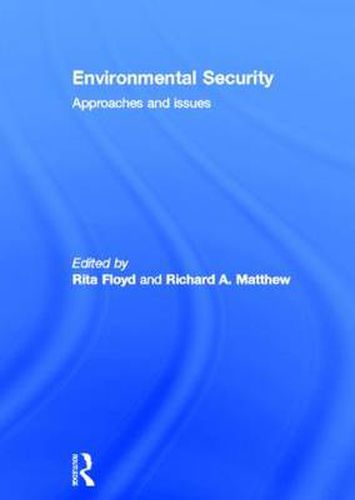Readings Newsletter
Become a Readings Member to make your shopping experience even easier.
Sign in or sign up for free!
You’re not far away from qualifying for FREE standard shipping within Australia
You’ve qualified for FREE standard shipping within Australia
The cart is loading…






Economic development, population growth and poor resource management have combined to alter the planet’s natural environment in dramatic and alarming ways. For over twenty years, considerable research and debate have focused on clarifying or disputing linkages between various forms of environmental change and various understandings of security. At one extreme lie sceptics who contend that the linkages are weak or even non-existent; they are simply attempts to harness the resources of the security arena to an environmental agenda. At the other extreme lie those who believe that these linkages may be the most important drivers of security in the 21st century; indeed, the very future of humankind may be at stake.
This book brings together contributions from a range of disciplines to present a critical and comprehensive overview of the research and debate linking environmental factors to security. It provides a framework for representing and understanding key areas of intellectual convergence and disagreement, clarifying achievements of the research as well as identifying its weaknesses and gaps. Part I explores the various ways environmental change and security have been linked, and provides principal critiques of this linkage. Part II explores the linkage through analysis of key issue areas such as climate change, energy, water, food, population, and development. Finally, the book concludes with a discussion of the value of this subfield of security studies, and with some ideas about the questions it might profitably address in the future.
This volume is the first to provide a comprehensive overview of the field. With contributions from around the world, it combines established and emerging scholars to offer a platform for the next wave of research and policy activity. It is invaluable for both students and practitioners interested in international relations, environment studies and human geography.
$9.00 standard shipping within Australia
FREE standard shipping within Australia for orders over $100.00
Express & International shipping calculated at checkout
Economic development, population growth and poor resource management have combined to alter the planet’s natural environment in dramatic and alarming ways. For over twenty years, considerable research and debate have focused on clarifying or disputing linkages between various forms of environmental change and various understandings of security. At one extreme lie sceptics who contend that the linkages are weak or even non-existent; they are simply attempts to harness the resources of the security arena to an environmental agenda. At the other extreme lie those who believe that these linkages may be the most important drivers of security in the 21st century; indeed, the very future of humankind may be at stake.
This book brings together contributions from a range of disciplines to present a critical and comprehensive overview of the research and debate linking environmental factors to security. It provides a framework for representing and understanding key areas of intellectual convergence and disagreement, clarifying achievements of the research as well as identifying its weaknesses and gaps. Part I explores the various ways environmental change and security have been linked, and provides principal critiques of this linkage. Part II explores the linkage through analysis of key issue areas such as climate change, energy, water, food, population, and development. Finally, the book concludes with a discussion of the value of this subfield of security studies, and with some ideas about the questions it might profitably address in the future.
This volume is the first to provide a comprehensive overview of the field. With contributions from around the world, it combines established and emerging scholars to offer a platform for the next wave of research and policy activity. It is invaluable for both students and practitioners interested in international relations, environment studies and human geography.